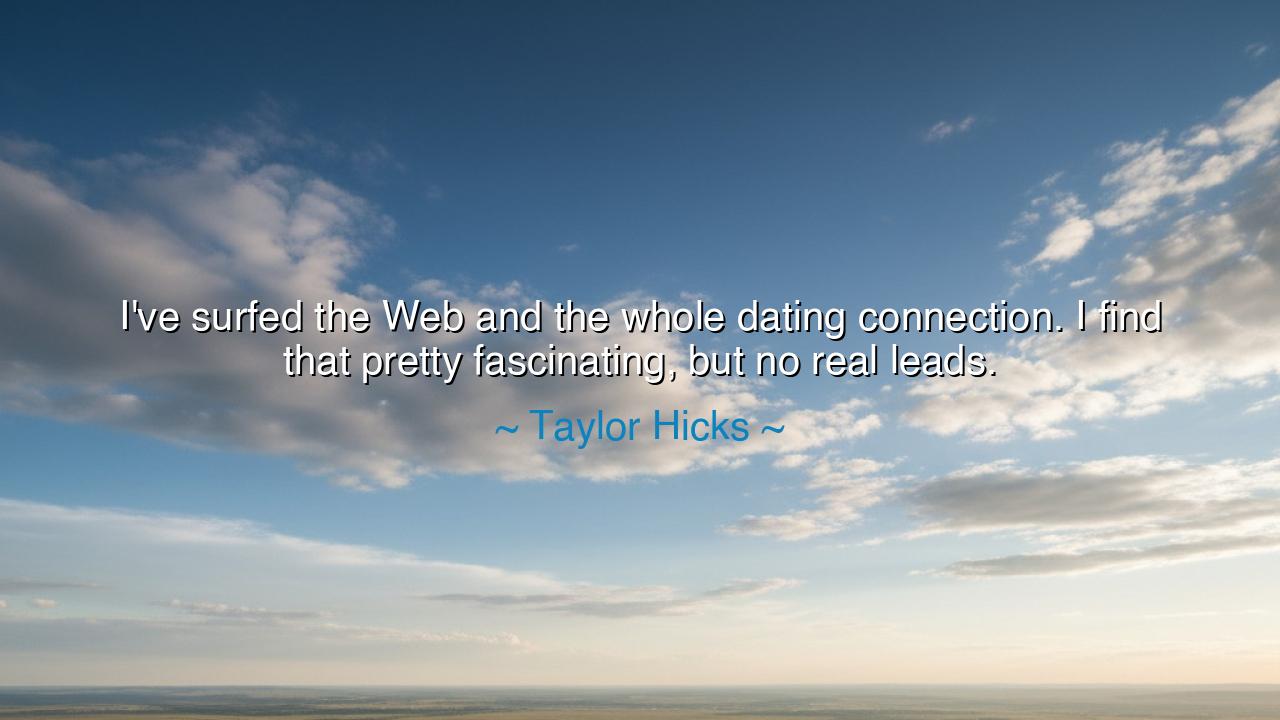
I've surfed the Web and the whole dating connection. I find that
I've surfed the Web and the whole dating connection. I find that pretty fascinating, but no real leads.






The words of Taylor Hicks — “I’ve surfed the Web and the whole dating connection. I find that pretty fascinating, but no real leads.” — are spoken with humor and humility, yet they touch upon a truth far deeper than their simplicity first suggests. Beneath his light tone lies the age-old yearning of the human heart — the desire to connect, to find companionship that is both real and enduring. Hicks speaks from the modern world, yet the essence of his words belongs to every age: that while the tools of seeking may change, the quest for love remains a timeless and mysterious journey.
In his saying, the Web becomes not just a place of technology, but a vast ocean of longing — a digital sea where countless souls drift in search of one another. To “surf” it, as Hicks says, is to ride upon the surface of endless possibilities, to glimpse faces and voices from far and wide. It is a world rich in novelty and wonder, yet one that often leaves the heart unsatisfied. For though the ocean is wide, the deeper waters of true connection cannot be found in mere convenience. The ancients, who once sought love in marketplaces and temples, would recognize in this modern quest the same paradox: that the closer we seem to others, the more elusive genuine intimacy can become.
When Hicks admits there are “no real leads,” he speaks the truth known by many who search not just online, but in life itself — that love cannot be hunted like prey, nor summoned by force or formula. It arrives when the soul is ready, when two hearts happen to cross paths not by design, but by the mysterious hand of fate. The ancient Greeks called this Eros, the divine force that moves unseen, connecting souls across impossible distances. Even in our time of instant messages and endless profiles, that sacred force still refuses to obey our commands. Technology may bridge miles, but fate bridges hearts — and fate answers to no algorithm.
The ancients would have likened Hicks’s experience to that of a sailor lost amid sirens and shifting tides. Consider the tale of Odysseus, who journeyed across seas filled with both wonder and deception. He encountered enchantresses, storms, and illusions — yet his true home, his real love, waited patiently on distant shores. So it is for those who “surf” the vast web of modern life: many images appear, many temptations call, but the true harbor of the heart cannot be found by wandering endlessly through waves of distraction. The sailor’s compass must not point toward novelty, but toward authenticity — toward what is lasting, sincere, and true.
There is also wisdom in Hicks’s fascination. He does not scorn this new way of seeking — he marvels at it. This reveals a noble trait of the modern seeker: curiosity without cynicism. For every generation faces new forms of love’s pursuit — letters became telegraphs, telegraphs became calls, and calls became messages that cross the air itself. Each evolution brings both connection and confusion, yet the core yearning remains the same: to be known. The wise, like Hicks, understand that while the methods evolve, the heart’s language never changes.
From his words we may draw a lesson both gentle and profound: that one must explore the world — even its modern inventions — but never mistake the medium for the meaning. Technology may bring us together in form, but only truth, vulnerability, and patience bind us in spirit. The seeker of love must therefore balance curiosity with clarity, fascination with faith. As in the days of old, we must still learn to listen not merely to words on a screen, but to the quiet rhythm of another’s soul.
So let those who hear this teaching remember: it is not wrong to “surf the Web,” for in every wave of connection there lies the possibility of meeting another heart. But do not linger only upon the surface. Dive deeper — into empathy, into sincerity, into real human presence. Seek not merely to find someone, but to understand someone. And when love at last appears — whether through a chance meeting or a message sent across the ether — greet it not as a conquest, but as a miracle. For as Taylor Hicks reminds us, fascination alone is not enough; the heart’s true home is not discovered through searching alone, but through living, waiting, and believing that what is real will, in time, reveal itself.






AAdministratorAdministrator
Welcome, honored guests. Please leave a comment, we will respond soon